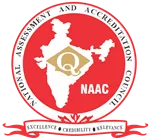- About Us
- Admission
- Academics
- Examination
- IQAC
- Research
- IIC
- Placements
- Student Support
- Anti - Ragging
- Citizenship Training
- Counselling
- Equal Opportunity Centre
- Mentorship
- Mid day Meal Scheme
- Scholarship
- Sexual Harassment (Prevention and Redressal)
- CQAC and SQAC
- Students Welfare
- Capability Enhancement and Development Schemes
- Assessing Learning Levels
- International Desk
- Student Grievance Redressal Committee SGRC
- St. Joseph's Boys Hostel - Apply
- Outreach
- Student Activities
- Infrastructure
- Sports
- Alumni Activities
The Choice Based Credit System has ensured a focus on holistic development of students involving, curricular, extra-curricular and extension activities while the OBE framework has ensured an outcome-based learning practice. In order to bring an overall congruence in the teaching-learning and evaluating methods, the evaluation method has been consciously designed to assess the all-round development of students involving their cognitive skills, problem solving skills, creativity and imagination.
Reforms in Examination and Evaluation Procedure:
The Examination Department is headed by the Principal and the CoE as a coordinator of the department who is ably assisted by nominated staff members selected to represent the Exam Committee. The Department of Examination abides by decisions taken by the College Administration and is duly supported by the various units of the administration.
Reforms are carried out in the examination and procedure to ensure a transparent and efficient examination system. Areas of improvement are identified through examination audits and feedback mechanism and the CoE initiates the reforms.
The following reforms were carried out in the past five years:
Examination Calendar (EC): The practice of preparing and adhering to an Examination Calendar was initiated. The EC is prepared in consultation with Heads of the Departments and the Vice-principal which is published in the college website and displayed in the college notice board for the benefit of the students. The Examination Department ensures a strict adherence to the calendar.
Impact: The EC has brought in transparency in the examination procedure and has ensured timely conduct of examination and publication of results.
Evaluation Boards: In order to ensure uniformity and standard in evaluation of answer scripts, an Evaluation Board is constituted for each paper. This board consists of senior faculty members and all faculty members evaluating the paper. The board discusses the question paper and a few answer scripts and decides on a uniform and standard pattern of evaluation.
Impact: This practice has ensured high standards in evaluation and has stamped a mark of authenticity to the results.
Result Analysis: The Controller of Examination constitutes a committee for a detailed analysis of the results, after the publication of ESE results. The committee examines the results in the light of previous performance and provides some valuable insights into student performance and evaluation methods. The Result Analysis is compiled by the CoE and is shared with all faculty members.
Impact: Result analysis has ensured concentration on student performance and has been able to identify areas of improvement in teaching-learning methodology.
Review and Retotaling: After the evaluation of the answer script by the evaluator, the paper is reviewed by the reviewer and the paper is then re-checked for correctness and marks are retotaled to remove errors in totaling of marks.
Impact: The procedure of retotaling of marks had led to an error free evaluation and quick publication of results. As a result of this procedure there has been a reduction in grievances and in application for re-evaluation and retotaling of marks.
Question paper Audit: The CoE constitutes a Board of Examiners (BoE) for each paper. The BoE’s task is to review the question papers set by the faculty members (both, internal and external faculty members) and to ensure that the QP follows the approved pattern and covers the entire syllabus. The question papers are again audited by external members, post the ESE results, to gain feedback.
Impact: The review of QPs by the BoE ensure high standards in QP setting and helps in removing any incongruities and inconsistencies in the QP.
IT Integration in Examination and Evaluation Procedure
End-to-End Automation of the examination procedure has been achieved by integrating information technologies in the examination and evaluation procedure. Below are the details of the integration:
- Online display of Exam notices through ERP and website
- Online registration for the End Semester Examination through ERP
- Automated seating arrangement through ERP
- Online publication of seating arrangement
- Utilization of Barcode Scanners for marks entry
- Online entry of CIA marks
- Online publication of results
IT Integration in Reforms in CIA
- LMS platforms are utilized to conduct CIA tasks
- Language departments conduct CIA tasks for 30 marks which involves all round evaluation of student performance.
- Innovative CIA tasks are given by the faculty members according to the requirement of the subject.
Other reforms:
- Transformation of Grade Point Average (GPA): The GPA has now been raised to a 10-point scale from a 6-point scale, in compliance with the Bangalore University practice.
- Security Features: New security features have been introduced in the printing of Marks Cards. There is a total of 12 security features that are unique to the Marks Card printed by the college. The security features ensure that the Marks Card of SJCC cannot be duplicated by another person. These security features are published in the college website so that the verification can be done by any person.
- E-Verification of Marks Card: Employers can verify the In order to facilitate the process of verification of Marks Card by external entities like the corporate companies who recruit students for jobs, the institution provides them with an option of online verification. The companies can log into the college website and verify the marks card of potential recruits.
- Renovation of Examination Centre: The Examination Centre has been renewed by adding additional floor space for the purpose of printing of question papers, storing of answer booklets and other documents. Additional space has been created for conducting meetings. New equipment such as copier machines, Barcode Scanners and Digital Signage boards have been added to the centre.
Best Practices:
The Examination Department has instituted a number of practices for a smooth functioning of exams and to assist the students with any requirement:- Special provisions for differently abled students have been created for their benefit. They are given separate rooms with adequate facilities for writing the exam and also additional time, if required.
- The best answer scripts are identified by the evaluators and a copy of it is displayed in the library for the benefit of the students.
- Workshops are conducted to the faculty members on best practices involving question paper setting.
- All old question papers are available in the college website and in the college library.
- A separate section has been dedicated in the Student Handbook for explaining the examination procedure.
Green Practices:
The below mentioned green practices have been adopted by the Examination Centre:- The number of sheets in the answer booklet has been reduced
- Old answer scripts are sent for recycling
- Only paper and cloth bags are used examination purposes thereby avoiding plastic use
- All notices are sent through online, thereby reducing use of papers
- Papers are reused for printing purposes



.webp)
.webp)
.webp)
.webp)
